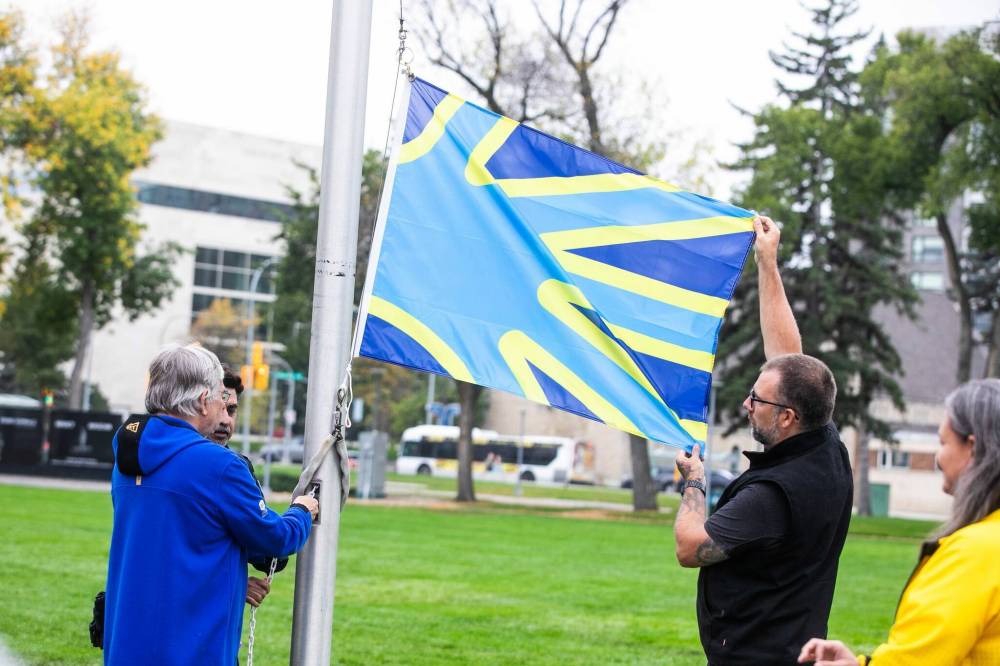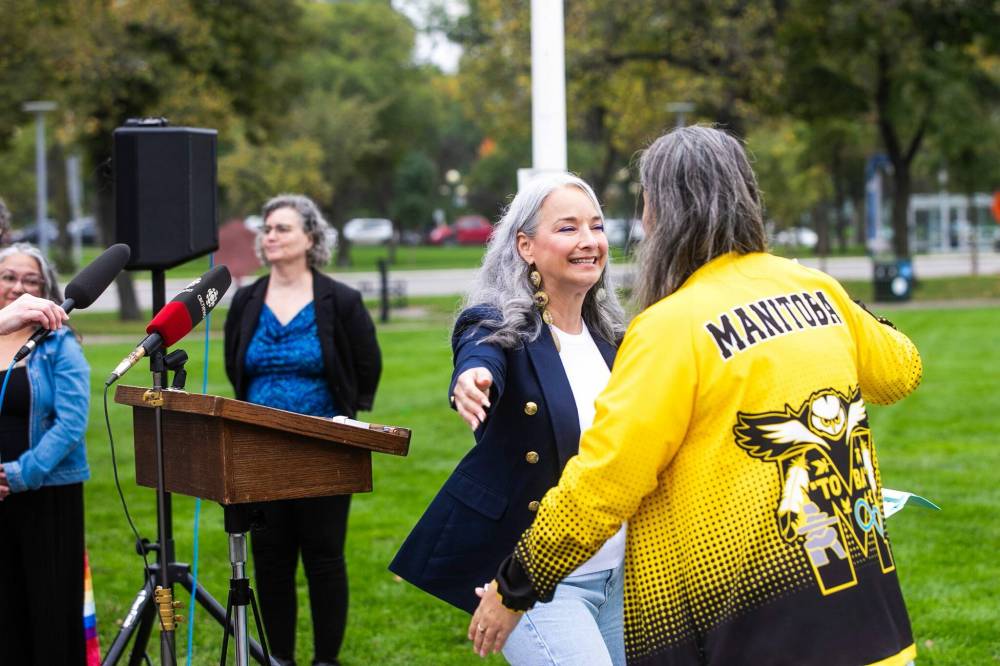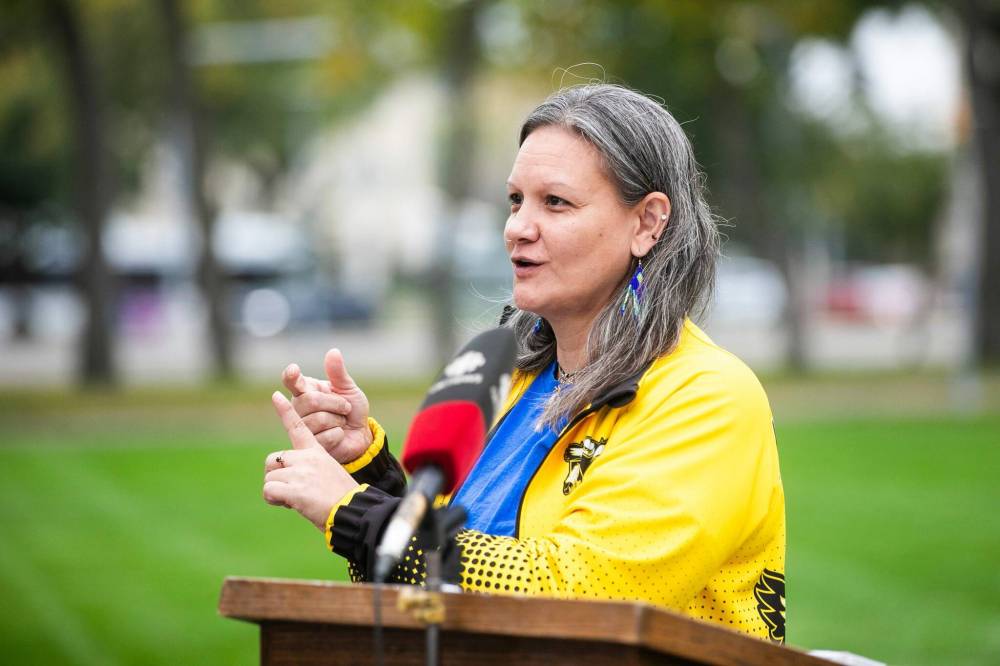Minister says law on sign language services in works
Promise made months after Fontaine’s infamous ‘hot mic’ incident
Advertisement
Read this article for free:
or
Already have an account? Log in here »
To continue reading, please subscribe:
Monthly Digital Subscription
$0 for the first 4 weeks*
- Enjoy unlimited reading on winnipegfreepress.com
- Read the E-Edition, our digital replica newspaper
- Access News Break, our award-winning app
- Play interactive puzzles
*No charge for 4 weeks then price increases to the regular rate of $19.95 plus GST every four weeks. Offer available to new and qualified returning subscribers only. Cancel any time.
Monthly Digital Subscription
$4.99/week*
- Enjoy unlimited reading on winnipegfreepress.com
- Read the E-Edition, our digital replica newspaper
- Access News Break, our award-winning app
- Play interactive puzzles
*Billed as $19.95 plus GST every four weeks. Cancel any time.
To continue reading, please subscribe:
Add Free Press access to your Brandon Sun subscription for only an additional
$1 for the first 4 weeks*
*Your next subscription payment will increase by $1.00 and you will be charged $16.99 plus GST for four weeks. After four weeks, your payment will increase to $23.99 plus GST every four weeks.
Read unlimited articles for free today:
or
Already have an account? Log in here »
Manitoba’s accessibility minister hinted her office is drafting legislation to increase access to and recognition of American and Indigenous sign language services.
Three months after she was caught complaining about an ASL interpreter on a “hot mic,” Nahanni Fontaine gave members of the deaf community an update about her office’s work on the file.
Fontaine, whose portfolio includes families, gender equity and accessibility, said efforts are underway to make real-time captioning and other interpretation services more available, consistent and reliable across local governments.

MIKAELA MACKENZIE / FREE PRESS
Manitoba Deaf Association board members Doug Momotiuk (left) and Kayle Miller raise the deaf flag in Memorial Park in front of the Legislative Building on Tuesday.
“We are exploring ways to support recognition of ASL and Indigenous sign languages as important parts of Manitoba’s cultural and linguistic landscape,” Fontaine said Tuesday at Memorial Park following a first-of-its-kind flag raising. “These are steps forward.”
While MLAs are unable to disclose the contents of yet-to-be-tabled legislation, the cabinet minister later told reporters there were “Easter eggs” in her latest speech for what’s to come.
The minister faced widespread backlash over remarks she made on June 26 when she mistakenly assumed she wasn’t being recorded. APTN released footage of Fontaine complaining about an ASL interpreter who shared a stage with her at the summer gala.
She has since issued numerous apologies and pledged to have sign language interpreters at all her future events. The province has also announced plans to hire two dedicated interpreters.
On Tuesday, surrounded by fellow members of the deaf and hard of hearing community, Kayle Miller and Doug Momotiuk hoisted a banner up a pole overlooking the park.
Cheers — communicated by attendees raising hands above their heads and twisting them repeatedly like cheerleaders celebrating with pom-poms (the ASL sign for celebration) — erupted in response.
“To see our flag raised makes us very proud,” Robert Zimmer told the Free Press through an ASL interpreter.
Shawna Joynt, president of the Manitoba Deaf Association, confirmed it was the first time her association had ever raised the deaf flag.
Joynt’s team organized the event in celebration of both the International Day of Sign Languages and ongoing week of worldwide celebration of deaf people. The latter is held annually during the last full week of September.

MIKAELA MACKENZIE / FREE PRESS
MLA Nahanni Fontaine hugs Manitoba Deaf Association president Shawna Joynt at the deaf flag-raising in Memorial Park on Tuesday.
The crowd of roughly 30 people gathered in downtown Winnipeg was told the deaf flag represents unity, enlightenment and interconnectedness with the environment.
French deafblind artist Arnaud Balard designed it in 2013. A decade later, his artwork, which depicts a turquoise-coloured hand that is outlined in yellow, was endorsed by the World Federation of the Deaf.
The backdrop is dark blue, a nod to the federation’s logo and coloured ribbons worn across the world in support of deaf people and their cultures.
“Every child, every person deserves the opportunity to communicate in the language that best reflects who they are,” said Lindsay Cooke, chief executive officer of Manitoba Possible.
Cooke was one of several speakers who delivered their remarks through a mix of ASL and English.
Progressive Conservative accessibility critic Jodie Byram also showed off her basic ASL skills.
The PC MLA for Agassiz said she’s learned about the “pressing need to expand ASL training and support” by meeting with deaf community members in recent months.
Zimmer, who was born deaf, arrived on the legislature grounds early to take two of the newest members of the local deaf community — an Afghan woman and a man who recently arrived from Myanmar — on a tour.
He works with Manitoba Possible to teach American Sign Language to refugees and immigrants.

MIKAELA MACKENZIE / FREE PRESS
Shawna Joynt, president of the Manitoba Deaf Association, said it was the first time her association had ever raised the deaf flag.
Zimmer said the flag-raising ceremony is an important gesture “to show the hearing world what it means to be deaf.” The flag is a symbol of deaf culture, mores and skills, he added.
Also Tuesday, Red River College Polytechnic celebrated adding the deaf flag to the roster of banners on display in front of the Notre Dame campus.
The raising of this flag — also a first at RRC Polytech — shows individuals who are deaf or hard of hearing “that they are welcome and supported on our campuses,” president Fred Meier said in a press release.
RRC Polytech recently overhauled its ASL-English interpretation program. Nine students are enrolled in the new advanced diploma program this fall.
The revamped course, which prepares students for ASL education- and interpreter-related careers, takes three years of full-time study to complete.
maggie.macintosh@freepress.mb.ca

Maggie Macintosh
Education reporter
Maggie Macintosh reports on education for the Free Press. Originally from Hamilton, Ont., she first reported for the Free Press in 2017. Read more about Maggie.
Funding for the Free Press education reporter comes from the Government of Canada through the Local Journalism Initiative.
Every piece of reporting Maggie produces is reviewed by an editing team before it is posted online or published in print — part of the Free Press‘s tradition, since 1872, of producing reliable independent journalism. Read more about Free Press’s history and mandate, and learn how our newsroom operates.
Our newsroom depends on a growing audience of readers to power our journalism. If you are not a paid reader, please consider becoming a subscriber.
Our newsroom depends on its audience of readers to power our journalism. Thank you for your support.
History
Updated on Tuesday, September 23, 2025 7:23 PM CDT: Corrects typo





